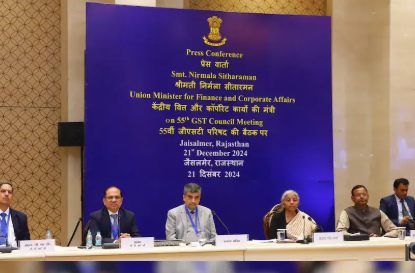55th GST Council Meeting Highlights
The 55th GST Council meeting took place in Jaisalmer, chaired by Finance Minister Nirmala Sitharaman. The meeting focused on issues, particularly the tax treatment of gift vouchers and GST charges on Floor Space Index (FSI) payments by builders.
Gift Vouchers Tax Treatment
The GST Fitment Committee has reviewed gift vouchers’ tax implications. The primary question is whether these vouchers qualify as money for tax purposes. The Committee suggests that since vouchers are prepaid instruments recognized by the RBI, they should be treated like money. Consequently, transactions involving vouchers would not incur GST. However, purchases made using vouchers may still be subject to GST.
Legal Precedents on Vouchers
Legal interpretations regarding gift vouchers have varied. In February 2023, the Karnataka High Court ruled that gift vouchers, cashback vouchers, and e-vouchers are not classified as goods or services. This ruling impacts how vouchers are treated under GST legislation.
FSI Charges and GST Implications
The taxability of FSI charges is another focal point of the meeting. Builders argue that these charges should not attract GST, as they do not constitute goods or services. Conversely, tax authorities maintain that FSI charges should be taxable. The Fitment Committee has recommended applying GST to these charges under the Reverse Charge Mechanism (RCM).
The GST Council will deliberate on the recommendations from the Fitment Committee. The outcome of these discussions will influence the tax landscape for gift vouchers and FSI charges. Stakeholders await clarity on how these rulings will shape future tax obligations.
GKToday Notes:
- GST Fitment Committee: This committee prepares recommendations for the GST Council. It evaluates tax implications for various issues. Its insights influence tax policy decisions .
- Floor Space Index (FSI): FSI determines the maximum buildable area on a plot. It influences urban planning and construction. Builders often debate its tax implications under GST.
- Reverse Charge Mechanism (RCM): RCM shifts tax liability from supplier to recipient. It applies in specific transactions. This mechanism aims to simplify tax collection in certain sectors.
- Karnataka High Court: This court adjudicates legal matters in Karnataka. In February 2023, it ruled on gift vouchers. Its decisions impact GST treatment of financial instruments.
Month: Current Affairs - December, 2024
Category: Legal & Constitution Current Affairs








